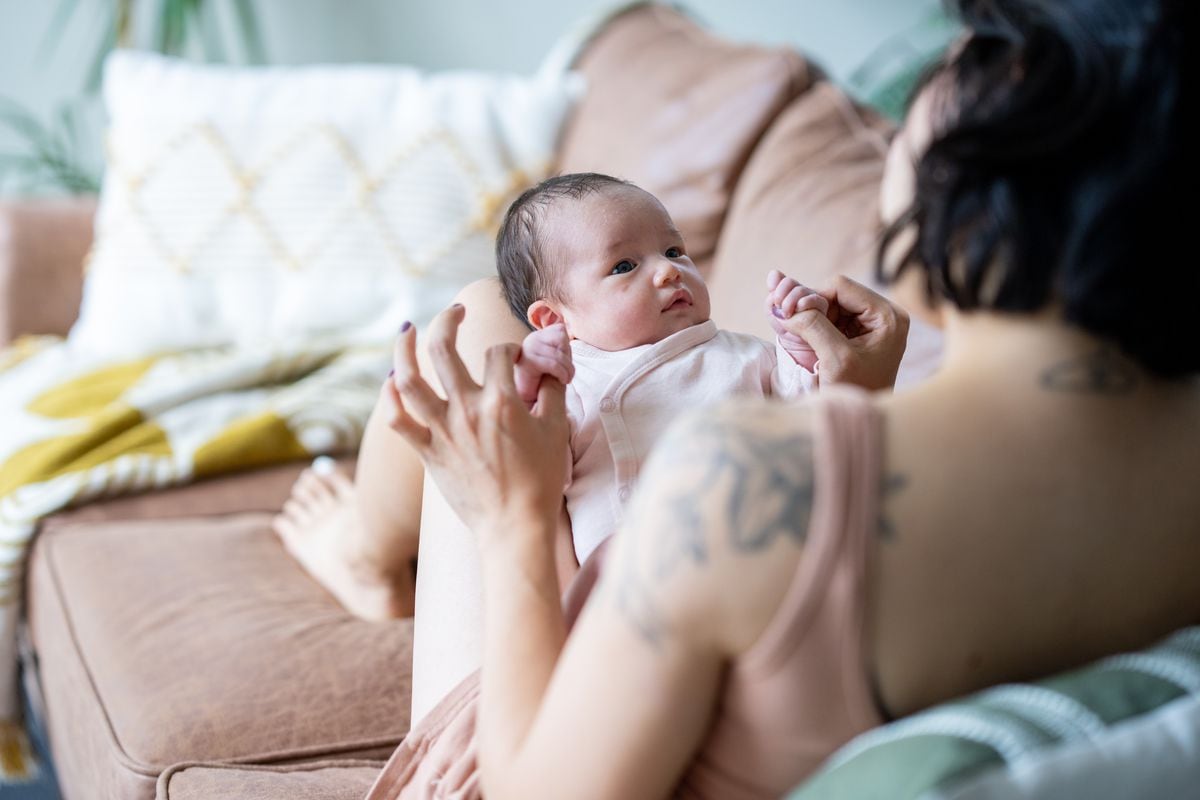He has lost his job and doesn't feel like eating.
The smell of chicken makes her gag, also when she remembers the day she decided to leave her four-year-old daughter alone in her bed, surrounded by her toys and her phone, because she couldn't go back. to miss work.
The life of Catalina Delgado (fictitious name), a 23-year-old Colombian, has been stopped at that moment, when she closed the door of her house in Madrid at 10:30 p.m. on February 16.
A few hours later, she was shackled in the bar where she worked.
And her daughter went directly to a juvenile center.
He hasn't slept with her for 35 days.
She is also six months pregnant and has only been seen by a doctor in the emergency room.
She faces a trial for abandonment of minors – punishable by up to three years in prison – stalled by a strike by judicial lawyers.
While everything gets complicated
She makes a pilgrimage to a different institution every day, calls her daughter to the center, sees her once a week, and returns to another association.
Without work, without money, without medical attention and now without her daughter, she tries to survive in a country that squeezes her more every day.
And she feels that she is drowning.
Delgado knows more about drowning than a girl her age should.
She grew up in the jungle department of Putumayo, on the Colombian border between Peru and Ecuador, the gateway to the Amazon.
One of those corners that environmentalists try to save while armed groups fight for people's lives.
The largest areas of cocaine cultivated in all of Colombia are concentrated on these lands, 31,000 hectares (31,000 stadiums such as the Santiago Bernabéu
,
half of all Madrid).
From there his family fled to Cali, some 18 hours away by bus.
And even there he returned years later with the father of his daughter.
Shortly before deciding to leave her country with the girl and two of her four brothers, on a non-return flight to Madrid, in November 2019, the narco shot the house where they lived.
Nine months after landing in Spain, they denied him asylum, he says.
Her life was not considered at risk.
Delgado did not expect that he was going to suffer the hardest episode in Madrid.
"I swear this is the hardest thing I've ever experienced," he insists.
She finds herself engulfed by the same spiral of misery in which thousands of hers live together: no asylum, no papers;
without papers, there is no contract;
without a payroll, there is no way to get a flat in her name;
without a registered address, there is no padrón.
Without a register, she cannot access social assistance or a doctor who monitors her pregnancy.
In her case, her help could alleviate her situation of extreme vulnerability.
Like access to municipal or regional programs that support mothers like her or a scholarship in her daughter's school canteen, which she was denied, for which she ended up paying a fee of 100 euros a month.
The police went to Delgado's home on the night of February 16 due to a call from a neighbor, who alerted the authorities to the crying of the girl on the other side of the wall.
A colleague who lived with them opened the door for the agents when he returned from work that night.
From the phone that Delgado had left next to her daughter, they found her working in a bar in Villaverde.
And that night her little girl slept for the first time in the center and her mother, in a dungeon.
Since then, the process has been stopped.
The judge's verdict can mark your file with a criminal record, torpedoing any opportunity to get your papers and apply for a better and more stable job.
The Community of Madrid, which provisionally withdrew the girl's custody immediately, continues to study her case.
"She is working on reincorporation and looking for support alternatives", they explain in the Family Counseling.
The drawing that the girl made to her mother this Wednesday in the juvenile center.
On Wednesday, Delgado visits his daughter at 10 in the morning and brings her jelly beans and a bag of Doritos.
Although she would really like to make him a sweat,
“with his little rice, his little fish or meat and an apple, which is his favorite fruit”.
And, as she remembers her lunches, she bursts into tears.
She has one hour a week to see the girl.
The rest of the time, she has to make do with a 15-minute phone call every afternoon.
“But, mom, where are you?” Delgado says that he asks her daughter every time they talk.
“The police brought me here because you left me alone and I cried.
You're never going to leave me alone again, are you?" she repeats.
She cannot tell her that she is in her house, in their house, because then the girl would not understand anything.
That she can't take her to her school in Vallecas, to see her friends or to the park in the afternoons.
“I tell her that I'm going to work and that she has to stay there,” she explains.
But he hasn't worked for a month.
The belly begins to peek out suspiciously from under the down jacket.
She covers it up, like she's embarrassed.
Her partner and the father of that child went to another country a week before everything exploded to look for a more profitable job.
And now she is alone.
Her only family in Spain are her brother and her sister-in-law who survive as best they can with precarious jobs in the black and two children.
That night, everyone who used to help her failed her.
A friend, in addition to her brother and her sister-in-law, are the main witnesses in her case, but there are also testimonies from the public school in Vallecas to which she took the girl and from the pediatrician.
“I am not what they say about me.
I am not a bad mother, all this is like a nightmare, ”she says.
He survives as best he can these days, with his three-year savings, spending the minimum in an increasingly expensive country and especially for foreigners without papers.
A room in a shared apartment in Ascao costs her 350 euros a month, although she barely earned 1,000 euros caring for the elderly.
The two with whom she worked – a man in Teruel in 2020 and a woman in Leganés – died, and she had to resort to the Villaverde bar as the only option.
She had been at that job for less than a month when she was arrested.
She now fears that with her pregnancy it will be even more difficult for her to find another job.
Spain, in the European sights for the treatment of migrant families
This woman's battle to get her daughter back is that of many other poor women in Spain, also migrants.
A little over a month ago, the Superior Court of Justice of Castilla y León sentenced the community's Family Department to pay 150,000 euros to a Bulgarian mother and her two twin daughters for having withdrawn custody in 2016. The sentence considered that they acted with an "abysmal disproportion" for a year, which caused "traumas" in the girls, who were then 12. In at least three other cases, the European Court of Human Rights has condemned Spain for actions that violate the rights of foreign fathers and mothers and their children.
In 2012,
The experts consulted agree that child protection systems fail to prevent people who do not have resources from losing their children and denounce the lack of support.
At the office of José Antonio Bosch, a lawyer with extensive experience in matters of minors, come those cases in which the system does not protect mothers or their children.
Bosch recalls that in Spain there are almost 36,000 minors under the care of the autonomous communities, a number that seems "extremely high".
The lawyer is critical of the protection mechanisms: "You can ask the Junta de Andalucía, for example, how many kilos of tuna pass through the Strait and its average diameter, but don't even think about asking what the result of the protection policy is juvenile.
What do we do with the children? What level of studies do they reach?
The lawyer does not analyze the specific case of Delgado and his daughter, but frames it in a dynamic that he knows well.
“The Administration's mission should not be to protect the minor outside the home, but to the extent possible within her family.
That is the challenge, although what is usually done is to opt for the fastest and cheapest route, which is to withdraw the children.
It is outrageous that from living with a son you go to see him once a week.
And the administrations take a long time to decide on the future of the child, ”he sums up.
Subscribe here
to our daily newsletter about Madrid.
Subscribe to continue reading
Read without limits
Keep reading
I'm already a subscriber


/cloudfront-eu-central-1.images.arcpublishing.com/prisa/EJM4QIP3DRFBDPKSBLVSA5YHYU.jpg)


/cloudfront-eu-central-1.images.arcpublishing.com/prisa/YMKYXE7EWNAC5MC2DH7TJQ7LYE.jpg)


/cloudfront-eu-central-1.images.arcpublishing.com/prisa/K3IUK6G7UPD3H5FDPPQN7CIGIE.jpg)
/cloudfront-eu-central-1.images.arcpublishing.com/prisa/MKA7DYZMDZECTCMZXQEAEUDL4E.jpg)





